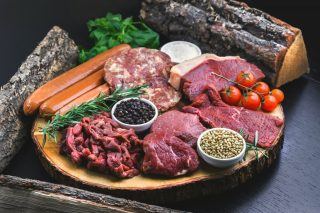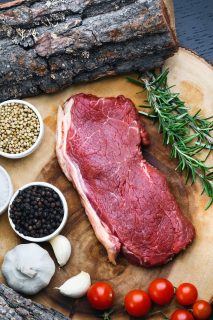Though turkey (white meat) is typically the food of choice over Christmas in the western world, we also tend to eat red meat alongside it. Often, this includes a lot of highly processed foods like sausages and bacon. Not only are these foods typically not great for us to eat, but eating too much red meat is also damaging to the planet. The environmental impact of having beef or lamb on the holiday table (especially on a regular basis) is enormous. Here are a few reasons why you might want to consider reducing your reliance on red meat this festive season.
What is red meat, and why might you want to avoid it?

Photo by Eiliv-Sonas Aceron on Unsplash
Red meat can be described as the meat of mammals that is red when it’s raw. It’s definitely one of the most controversial foods. As humans, we have been eating red meat for many years, and it seems to have influenced our evolution positively. But now, many studies seem to indicate that red meat isn’t actually that good for us at all.
Because we as a population have been eating red meat for so long, our digestive systems are well equipped to handle it. However, the meat that we are eating these days isn’t what it used to be. The Masai eat a lot more red meat than the average westerner but remains fit and healthy. This is likely because the meat that we as Westerners eat is no longer from animals that roam free and eat what is natural to them.
Instead, the meat that we eat is largely factory-raised and fed a grain-based diet. The cows we eat are also often fed growth-boosting hormones and antibiotics. Another issue with the meat products that we eat these days is that they are also highly processed. It isn’t just the meat that we eat. Instead, it is “smoked, cured and then treated with nitrates, preservatives and various chemicals”.
What are the different types of meat?
When it comes to meat, we tend to use the term as a coverall. However, meats are not all the same. According to Healthline, these are the different types of meat you get:
- Processed meat: Mostly, this meat comes from factory-raised animals. Once the cows are slaughtered, the meat goes through a variety of processing
 methods. Examples of processed meats include foods such as sausages and bacon.
methods. Examples of processed meats include foods such as sausages and bacon.
- Conventional red meat: In this case, the meat is usually not processed and if it is, the amount of processing is limited. Like processed meats, the animals are typically factory farmed. This category includes all meats that are red when raw such as lamb, beef, and pork.
- White meat: These include only meats that are white when cooked. Examples of these are chicken and turkey.
- Grass-fed, organic meat: This type of meat is probably the closest to what the Masai are eating. These animals are fed on what is available naturally and are raised without the use of any drugs or hormones. There are also no chemicals added to the meat during production.
Why you should at least avoid processed foods

hlphoto/shutterstock
They’re particularly bad for you when eaten in large quantities. One of the major problems with processed foods is that they’re cheap and tend to taste very good. This, of course, leads to overconsumption, which is where the issues start. Processed foods are often high in sugar, saturated fat, and salt but lack dietary fiber and vitamins.
One study of 100,000 adults found that increasing your intake of processed foods by just 10% increased your chances of cardiovascular disease, coronary heart disease, and cerebrovascular diseases by more than 10%.
Another study of 20,000 adults found that eating “more than 4 servings of processed food daily was linked with an increased risk of all-cause mortality”. For each additional serving after four, the risk increased by 18%. There is also substantial evidence that eating processed foods also leads to weight gain.
What makes red meat in particular so bad for the planet?
Processed meat (red or not) is bad for you, but red meat is, in general, also bad for the planet. Red meat is particularly bad for the environment. Reducing your intake of red meat is an excellent way to reduce your personal impact on the planet. The production of beef is hugely harmful to the environment. It requires “160 times more land and produces 11 times more greenhouse gases than staple plant-based foods”. This includes core foods like “potatoes, wheat, and rice”. According to LIVEKINDLY, for every kilogram of beef produced, “36 kilograms of CO2” is released into the atmosphere.

Photo by Eiliv-Sonas Aceron on Unsplash
Another issue with the production of beef is the large-scale farming it necessitates. Because of the high demand (especially in the western world), the scale of the land needed to produce the amount of meat required is enormous. Thus, cattle farming also contributes to deforestation as cattle farmers try to make more space for the cattle to graze. It seems that many of the fires in the Amazon rainforest were started on purpose by cattle farmers in need of more land.
Lamb also has a high carbon footprint. In fact, some scientists believe that its carbon footprint is even higher than that of beef. This seems to be due to the fact that lambs produce much less edible meat than cows. This means that, in order to get the same amount of meat, more sheep are needed.
Ultimately, this also leads to more wastage and, as a result, a larger impact on the environment. According to WRI food expert Brian Lipinski, a massive 83 percent of the greenhouse gas emissions of the average American’s diet are generated by animal products.
References
https://www.lhsfna.org/index.cfm/lifelines/may-2019/the-many-health-risks-of-processed-foods/
https://www.healthline.com/nutrition/is-red-meat-bad-for-you-or-good#TOC_TITLE_HDR_3
https://www.livekindly.co/red-meat-planet/
https://www.wri.org/insights/how-food-expert-brian-lipinski-eats-more-sustainably-during-holidays



 methods. Examples of
methods. Examples of ![women [longevity live]](https://longevitylive.com/wp-content/uploads/2020/01/photo-of-women-walking-down-the-street-1116984-100x100.jpg)










